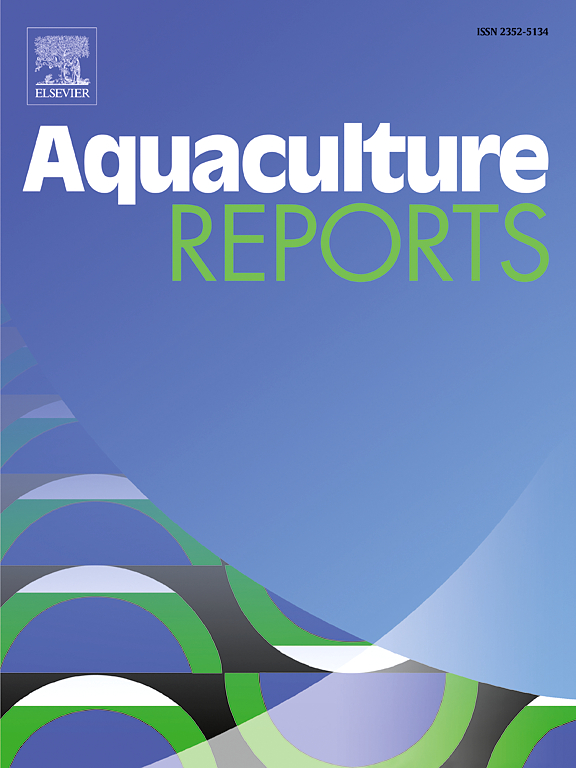Early sensory responses to plant-based diets in rainbow trout (Oncorhynchus mykiss) alevins: Impact on feeding behavior
IF 3.2
2区 农林科学
Q1 FISHERIES
引用次数: 0
Abstract
Smell and taste are key sensory modalities involved in nutrient detection and feeding behavior in fish. In rainbow trout (Oncorhynchus mykiss), early growth can be compromised when fishmeal and fish oil are replaced by plant-based ingredients. However, the sensory mechanisms involved in feed detection at the alevin stage remain poorly understood. This study aimed to investigate how plant-based diets affect gustatory and olfactory responses during early development, and how these changes relate to feeding behavior. A postprandial kinetic experiment was conducted from first feeding to 30 days, using two diets: a commercial-like diet (C), composed of fishmeal, fish oil, and plant ingredients, and a fully plant-based diet (V). Fish were either fasted or sampled at 20 min, 2 h, 6 h, 10 h, and 24 h post-feeding. We measured the expression of genes involved in nutrient sensing (fatty acids, amino acids, sugars), taste modalities (sweet, salty, sour, acidic, bitter, umami), and calcium signaling in the olfactory rosette and tongue. We also analyzed neurotransmitter pathways (serotonin and dopamine), appetite-regulating neuropeptides in the brain, and intestinal hormones (CCK, ghrelin). Results showed that fish fed the V diet had significantly reduced growth performance (p < 0.01) and feed intake after 30 days (p < 0.01), associated with altered sensory gene expression. In C-fed fish, nutrient and taste receptors were mainly upregulated in the tongue, while in V-fed fish, expression shifted toward the olfactory rosette. C-fed fish also showed distinct calcium signaling patterns in the tongue and higher serotonin turnover. Expression of melanocortin 4 receptors (mc4ra, mc4rb) was elevated in V-fed fish (p < 0.05), suggesting central anorexigenic signaling. Together, these results indicate that V diets disrupt early feeding responses through changes in sensory perception and neuroendocrine regulation. This highlights the importance of considering sensory cues when formulating sustainable feeds for aquaculture.
虹鳟(Oncorhynchus mykiss) alevins对植物性饮食的早期感觉反应:对摄食行为的影响
嗅觉和味觉是参与鱼类营养物质检测和摄食行为的关键感官形式。在虹鳟(Oncorhynchus mykiss)中,当鱼粉和鱼油被植物性成分取代时,早期生长可能会受到影响。然而,在发酵阶段参与饲料检测的感觉机制仍然知之甚少。本研究旨在探讨植物性饮食如何影响早期发育过程中的味觉和嗅觉反应,以及这些变化与摄食行为的关系。从第一次饲喂到第30天进行餐后动力学实验,使用两种日粮:一种是由鱼粉、鱼油和植物成分组成的类似商业的日粮(C),另一种是完全以植物为基础的日粮(V)。分别于饲喂后20 min、2 h、6 h、10 h和24 h禁食或取样。我们测量了参与营养感知(脂肪酸、氨基酸、糖)、味觉模式(甜、咸、酸、酸、苦、鲜味)和嗅觉花环和舌头中钙信号的基因表达。我们还分析了神经递质通路(血清素和多巴胺)、大脑中调节食欲的神经肽和肠道激素(CCK,胃饥饿素)。结果表明,V型饲料显著降低了30 d鱼的生长性能(p <; 0.01)和采食量(p <; 0.01),这与感觉基因表达的改变有关。在c型饲料中,营养和味觉受体主要在舌部上调,而在v型饲料中,表达向嗅觉莲座转移。喂食c的鱼在舌头上也显示出明显的钙信号模式和更高的血清素周转率。黑素皮质素4受体(mc4ra, mc4rb)的表达在v饲料鱼中升高(p <; 0.05),提示中枢厌食信号。总之,这些结果表明,V型饲料通过改变感觉知觉和神经内分泌调节来破坏早期摄食反应。这突出了在制定可持续水产养殖饲料时考虑感官线索的重要性。
本文章由计算机程序翻译,如有差异,请以英文原文为准。
求助全文
约1分钟内获得全文
求助全文
来源期刊

Aquaculture Reports
Agricultural and Biological Sciences-Animal Science and Zoology
CiteScore
5.90
自引率
8.10%
发文量
469
审稿时长
77 days
期刊介绍:
Aquaculture Reports will publish original research papers and reviews documenting outstanding science with a regional context and focus, answering the need for high quality information on novel species, systems and regions in emerging areas of aquaculture research and development, such as integrated multi-trophic aquaculture, urban aquaculture, ornamental, unfed aquaculture, offshore aquaculture and others. Papers having industry research as priority and encompassing product development research or current industry practice are encouraged.
 求助内容:
求助内容: 应助结果提醒方式:
应助结果提醒方式:


